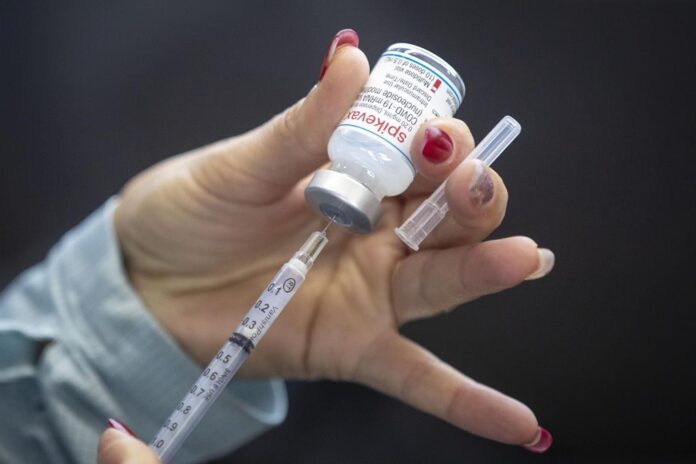A seventh wave of COVID-19 appears to be making its way through Canada, but confusion has set in among many about who is eligible for fourth doses of the vaccine and when they can get it.
Health experts say there’s no need to panic — as long as those who are most vulnerable to severe outcomes from the virus are as up to date as they can be with their vaccines, younger, healthy people should be fine to wait until fourth doses or even possibly updated vaccines are more widely available in the coming months.
“Those who are older than 60, those who are immunocompromised should be getting their fourth dose. And that’s really to reduce their risk of hospitalization moving forward,” said infectious disease specialist Dr. Zain Chagla.
“If you’ve had three doses now and you’re not in one of those groups over 60 or immunocompromised, you can be pretty reassured that your risk of hospitalization is very low.”
Last week, the National Advisory Committee on Immunization (NACI) came out with new guidance on vaccine booster shots for the fall in advance of a possible future wave of COVID-19 in Canada.
It recommended Canadians at increased risk of serious illness from COVID-19 should be offered a fall booster dose “regardless of the number of booster doses previously received.”
Ontario bracing for summer COVID-19 wave
It says this should include people 65 years of age and older, residents of long-term care or living facilities, and individuals 12 years of age and older with an underlying medical condition that places them at high risk of severe COVID-19.
NACI also recommended that boosters “may” be offered to all other individuals from 12 to 64 years of age, regardless of how many booster doses they have previously received.
Some provinces and territories, like Quebec, Prince Edward Island, Nunavut and Yukon have opened up their eligibility for second boosters — which would be a fourth dose of the vaccine — to anyone over the ages of 18 and 12, respectively, who have waited a certain number of months since their last dose.
But others, like Ontario, New Brunswick, Nova Scotia, Manitoba, Saskatchewan and the Northwest Territories are only offering second boosters to those over 50 and those who are immunocompromised as well as First Nations, Inuit and Metis.
Alberta and British Columbia, meanwhile, are only allowing fourth doses for those over 70 and vulnerable populations.
Both B.C.’s chief health officer, Dr. Bonnie Henry, and Ontario’s top doctor, Dr. Kieran Moore, said they are waiting to open second booster availability until more people in their provinces get their first boosters.
This has prompted concern from those not yet eligible, many of whom have taken their misgivings to social media.
What to expect from COVID-19 in the summer and fall? – Jun 30, 2022
In addition, some provinces have opened up eligibility to younger age groups while others haven’t, which has caused confusion and has raised questions about why there are mixed messages coming from public health officials on the same virus and vaccine depending on where one lives.
This non-uniform messaging at a time when the COVID-19 response has been under fire by many of those opposed to vaccines and lockdowns can diminish public trust in the system, says Dr. Isaac Bogoch, infectious diseases specialist at Toronto General Hospital.
Related News
Peterborough Public Health Unit advising residents to use caution when it comes to the COVID-19 pandemic
“When you have several seemingly credible voices recommending different approaches, and when you have guidance that sometimes contradicts what various experts are saying and when you have provinces with different policies, that all factors into greater confusion of the general public, and that breeds mistrust,” he said.
“I think that’s a major, major issue.”
But as the virus changes and as the world’s understanding of it shifts, advice on how to respond to it will shift and will be different for people of varying degrees of risk, Chagla said.
The flu vaccine, for example, has different doses for people based on their age and risk factors, as do other vaccines, he noted.
When COVID-19 vaccines first started rolling out, everyone needed them uniformly, so messaging could be the same across Canada. Now, depending on an individual’s previous vaccination status and personal risk factors, the advice could be different, Chagla said.
“Now, it really does have to be focused, but with (public health) transparently discussing why there is focus on certain populations compared to others.”
The main priority is to ensure anyone who hasn’t received a third dose yet — a group that encompasses millions of Canadians across the country — gets boosted, Bogoch said.
For those who are younger, healthy and up-to-date with their vaccines, there may be some benefits to holding off on fourth doses, given that some vaccine manufacturers have already submitted new formulations that protect against Omicron variants to health regulators, he said.
“I think people are frustrated that the system is not straightforward. This is a virus we’re learning from day by day,” Bogoch said.
“But, you know, we shouldn’t be frustrated if the messaging changes. It really is updating the science and figuring out that certain groups benefit better from more vaccines than other groups where the benefits are less profound.”
Related News
© 2022 Global News, a division of Corus Entertainment Inc.



